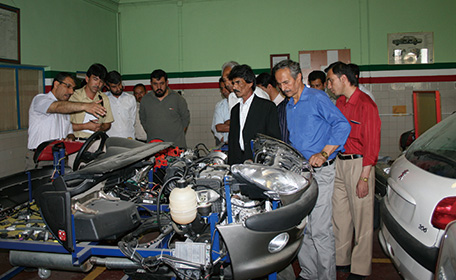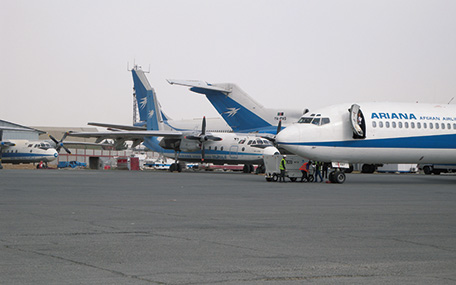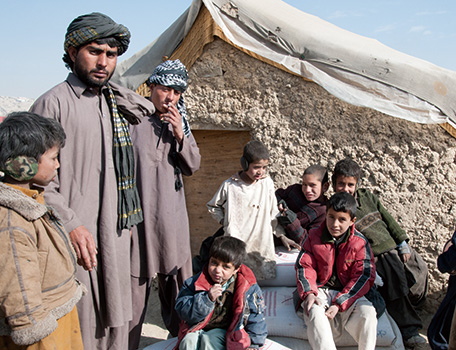Japan's Official Development Assistance White Paper 2012
(1) Assistance to Afghanistan and Pakistan
The continuing unstable situation in Afghanistan and Pakistan is a problem not only for these countries and the surrounding region, but for the entire world. The international community, including Japan supports Afghanistan to prevent the country from stepping back to a hotbed for terrorism. The stability of Pakistan, which plays an important role in eradicating terrorism including cleanup operations along the border with Afghanistan, is a key to the peace and stability of the region and the international community.
<Japan's Efforts>
●Afghanistan
Japan has consistently extended assistance of Afghanistan with the total of approximately $4.153 billion since October 2001.
Japan and Afghanistan jointly held the Tokyo Conference on Afghanistan on July 8, 2012. Representatives from around 80 countries and international institutions including Afghan President Hamid Karzai, UN Secretary-General Ban Ki-Moon and then-U.S. Secretary of State Hillary Clinton joined the conference and unveiled the Tokyo Declaration, which outlines a new partnership between Afghanistan and the international community throughout the "Transformation Decade" (2015-2024) following the security and political transitions. Japan announced that it would provide support of up to around $3 billion of assistance to Afghanistan in about five years from 2012 in the fields of socio-economic development and enhancement of security capacity. Japan also announced that it would implement projects worth around $1 billion in neighboring countries of Afghanistan to encourage regional cooperation between Afghanistan and its neighboring countries. (See this for more details)
●Pakistan
Japan has been actively engaged in assisting Pakistan since Pakistan announced its intention to fight against terrorism in cooperation with the international community following the terrorist attacks in the United States in 2001. In April 2009, the Japanese government co-hosted the Pakistan Donors Conference with the World Bank in Tokyo, and announced that it would extend up to $1 billion in assistance to Pakistan in two years.(Note 14) In November 2009, Japan announced the New Strategy to Counter the Threat of Terrorism and then steadily implemented the assistance of over $1 billion for sustainable and stable development of Pakistan, focusing on economic growth, macroeconomic reform, poverty reduction, and bringing stability to the lives of people in Khyber Pakhtunkhwa province (formerly known as the North-West Frontier Province) and Federally Administered Tribal Areas (FATA), which are at the border with Afghanistan and are breeding grounds for insurgents in and outside of Pakistan.(Note 15)

Afghan trainees learning automobile maintenance techniques from an Irani instructor who benefited from JICA transfer of technology. (Photo: JICA)
Note 14: Premised on the implementation of an IMF program aimed toward macro-economic stabilization, including economic and financial aspects.
Note 15: Includes aid for flooding in FY2010
●Afghanistan
(1) Project for Rehabilitation of Airfield Pavements at Kabul International Airport (October 2010 - Present) Grant Aid
(2) Project for Rehabilitation and Expansion of Aircraft Parking Aprons at Kabul International Airport (March 2012 - Present) Grant Aid
For landlocked nation of Afghanistan, development and improvements in the aviation field are vital to promote traffic of people and distribution of goods inside and outside the country, as well as to bolster economic growth and development. Kabul International Airport, located in the capital city of Kabul, is the largest airport in Afghanistan. Since 2002, Japan has provided assistance including equipment upgrades and international passenger terminal construction. Thanks to this support, the number of takeoffs and landings of the airport has increased largely in recent years. The number of passengers reached approximately 1.4 million in 2010, which is beyond initial expectations at 2002, and is expected to reach approximately 4 million in 2020.
However, the taxiway and aircraft parking apron at the airport have deteriorated significantly due to insufficient maintenance and the increase in flights in recent years. In addition to that, there is a shortage of apron space. It has been difficult to maintain safe and efficient flight operations. In response, Japan has supported paving and expanding the taxiway and apron and installing taxiway lighting.
It is expected to ensure safe and efficient flight operations at Kabul International Airport and to stimulate economic growth in Afghanistan by increasing the number of flights.
(As of December, 2012)

Aircraft parked in the unmarked apron. (Photo: JICA)

A camp for internally-displaced persons in Kabul. They evacuated from Kandahara and Helmand. (Photo: Mika Tanimoto/JICA)
